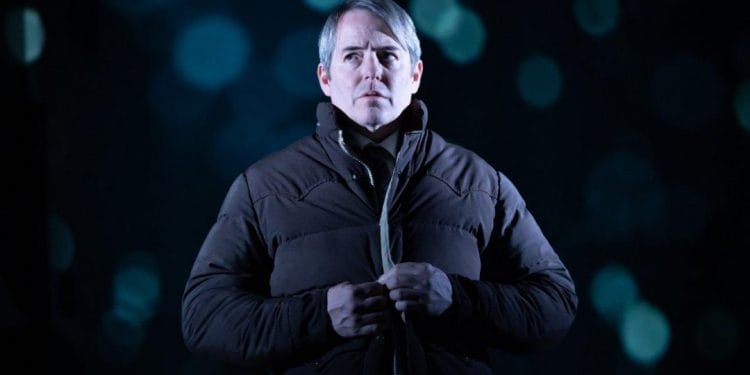It’s taken a full decade for Oscar Winner, Kenneth Lonergan’s The Starry Messenger to transfer from Broadway to London, but it brings with it leading man Matthew Broderick, making his West End debut alongside some impressive names from this side of the Atlantic. Add to that the towering talents of director Sam Yates, and it feels like the stars have truly aligned for this UK premiere.
Set in the mid-nineties, Mark (Broderick) is struggling to connect with anyone or anything, save his beloved planetarium which is due to be demolished. His wife and unseen son seem to be drifting further and further away. The loneliness and attempt to find his own place in the universe during this midlife crisis is nothing new, so it comes as no surprise when after teaching a class he meets Angela, some twenty years his junior, and that familiar story of a man having an affair with a younger woman starts to unfold.
The rest of the interweaving plot is less familiar. Running at three hours the main narrative in The Starry Messenger jostles for position with various sub plots, and while seemingly disparate, Lonergan’s script masterfully brings them all together, just don’t expect it to happen quickly. In the same way as the plot lines vie for position, the dialogue often intersects, it can be difficult at first, but far more like naturalistic conversation than most playwrights care to admit.
Often revolving around difficult or sensitive themes, the play is surprisingly humorous. Part of this comes from Broderick’s dry wit delivery, the rest from the genuinely funny lines so intricately sewn in to the script. Many of the funniest scenes are in the classroom, where the students provide a rich tapestry of characters to exploit for comic effect. Jenny Galloway displays immense comic timing as Mrs Pysner; unable to grasp the most basic concepts of astronomy, her facial expressions alone are a delight. While Sid Sagar shines as the serial class taker come critic, Ian.
Chiara Stevenson’s design works wonderfully well, three sets on a revolve, with a fourth dropping in to create the class room. But it’s Luke Halls’ projection design, alternating between dark clouds and starry night, replicating the planetarium projections, that create a true sense of what this play is trying to say. The only problem with Alex Baranowski’s compositions is that there aren’t enough of them, we get just the merest hint of what could be a wonderful soundscape as one set rotates in to another.
As Mark, Matthew Broderick gives a masterclass in stagecraft. His delivery is totally in tune with a character who see’s life in only two shades. Logic, fact and order lead the character and this is reinforced in Broderick’s precise and measured delivery. Elizabeth McGovern’s portrayal of wife, Anne, seems a touch off kilter to begin with, but only until you come to understand her character, and more importantly, the man she’s married to. Then do you realise the depth and nuance of McGovern’s performance.
Rosalind Eleazar gives a performance which could easily eclipse the better known performers on stage. She adapts her style beautifully from scene to scene, never coming across as ‘the other woman’ but more someone weighed down by religion and social status. Eleazar has a good chemistry with Jim Norton, playing Norman in one of the subplots, and it would have been good to have seen more of this dynamic explored.
Sam Yates has really grasped the pace of this production, each scene moves deftly in to the next, and the long running time goes by unnoticed. That said, the sheer wordiness sometimes overloads the key messages. The ending won’t be enough to satisfy some, but in reality represents how life often turns out, and that’s really what The Starry Messenger is, an authentic look at life as it slowly slips away from us.
Book The Starry Messenger Tickets
























